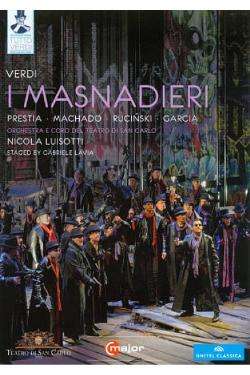|
Back
02/17/2013
Giuseppe Verdi: I masnadieri
Giacomo Prestia (Massimiliano), Aquiles Machado (Carlo), Artur Ruciński (Francesco), Lucrecia Garcia (Amalia), Walter Omaggio (Arminio), Dario Russo (Moser), Massimiliano Chiarolla (Rolla), Orchestra e Coro del Teatro di San Carlo, Salvatore Caputo (Chorus Master), Nicola Luisotti (Conductor), Gabriele Lavia (Stage Director), Alessandro Camera (Set Designer), Andrea Viotti (Costume Designer), Carlo Netti (Lighting Designer), Anna Razzi (Ballet School Director), Annalisa Buttò (Video Director), Hartmut Bender (Video Producer)
A production of Unitel Classica and RAI
Recorded live at the Teatro di San Carlo, Naples (March 21, 25, 27, 29 and 31, 2012) – 135’ (including bonus introduction)
C Major Entertainment # 722208 - Booklet in English, German, French and Italian Subtitles available in Italian, English, German, French, Spanish, Chinese, Korean and Japanese

   
Tutto Verdi is the ambitious C Major/Unitel Classica project of garnering Giuseppe Verdi’s 26 operas (including the Requiem) on DVD by his bicentennial October 9 birthday. The Orchestra e Coro del Teatro di San Carlo brought together a marvelous cast to complete number 11, I masnadieri, in this updated and compelling Gabriele Lavia production.
I masnadieri was composed during Verdi’s convalescence and the first Italian opera to premiere at Her Majesty’s Theatre in Haymarket, London on July 22, 1847. Popular singer Jenny Lind (Amalia) was upstaged when Verdi decided to pay more attention on the dramatic intents of the tenor’s role (Carlo). I masnadieri was ill-received by critics, the audience feeling slighted by Lind’s “demotion”, politely praised the performance with a feigned approach due to the discordant and violent music. The opera was only staged in London four times, and it has never since been an active work in the Italian repertoire.
I masnadieri predated Luisa Miller (1849), but both were sourced from Johann Christoph Friedrich von Schiller, in this case, the drama Die Räuber. Noteworthy are the interesting parallels of musical formulations, structure, arias and duets amongst the two. Nicola Luisotti sets brisk, effective pacing that never languishes; the orchestra is filled with accentuation and momentous dynamics.
Brigands conjures thugs or unsavory outlaws, and yet while the association is strong, this production never overdresses a raucous demeanor. Originally set in Germany in the early 18th century, Andrea Viotti’s somber costuming replaces the timeline somewhere into the 1930s. The dark dress adds to the broody but non bloody brawl. The blocking isn’t particularly energizing, but what is so successful is solid character development. This DVD has a marvelous cast of principals: all are polished, resonate, emotional. Aquiles Machado’s Carlos seethes with determination, and he contemplatively struggles with his recent “change in lifestyle.” He’s passionate in his vocal expression and the intensity is mighty powerful. Supported by the Coro di masnadieri, “Le rube, gli stupri, gl’incendi, le morti” has a brisk cadence with strong singing, but angry, defiante outlaws they’re not.
Lucrecia Garica handles her role with aplomb. Her voice is perfectly matched for Verdi’s Amalia, singing unflinchingly while projecting nicely in her arias (i.e. Amalia’s cavatina, “Venerabile, o padre, è il tuo sembiante”) and blending in beautifully during the duets (i.e. “Lassù risplendere” from Act III.) Artur Ruciński brings the evil component to stage as Francesco whose timbre is masculine yet velveteen. Walter Omaggio’s Arminio has an unnerving wavering, but, nonetheless, he is a linchpin to maintaining character connections as the steward to Count Moor’s family.
Statistically, I masnadieri reaches low marks: it ranks number 18 as Verdi’s most performed opera; this number sky rockets to 229th place in the frequency of performances worldwide. The benefit of I masnadieri lies within the Verdi music, character development and dynamic drama. Despite a ludicrous plot, I masnadieri is filled with memorable passages, giving it a “one-two” punch.
Christie Grimstad
|